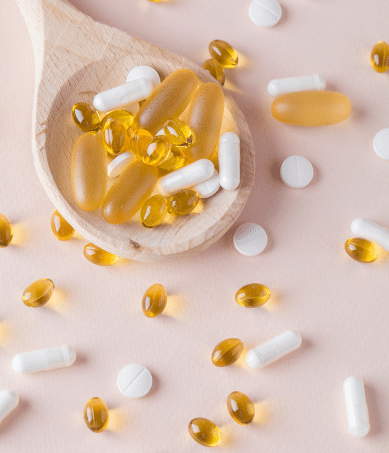Hiya Gorgeous!
Maintaining strong energy levels can become challenging once you hit 50 (trust me, I know…). Maybe you feel like your ‘get up and go is sufficiently lacking.
Maybe you want more energy to do the things you love (or spend time with the people you adore).
Whatever your “why,” with the right strategies, it’s possible to increase your energy and maintain an active, vibrant—dare I say thriving—life. Are you ready to get started?
#1: Boost Energy Levels by Prioritizing Whole Foods
Eating the right foods is crucial for maintaining energy. What should you focus on?
Whole Grains
Whole grains can help those over 50 battle a number of conditions they become more prone to with age: high cholesterol, high blood pressure, and weight concerns. A diet that includes whole grains can also lower your risk of heart disease at any age (source).
Foods like oats, quinoa, and brown rice provide complex carbohydrates for sustained energy. Bonus? According to research, a higher intake of whole grains is associated with better mood and lowered anxiety.
Protein
Adults between the ages of 40–80 lose 30–50% of their muscle mass due to normal aging processes (partially because their body isn’t as adept at using protein to build muscle as it once was).
That’s why you may need to consume more protein than you used to. Vegetarians and vegans can find protein in tempeh, lentils, legumes, hemp seeds, almonds, and more. Try to get about 0.36 grams of protein per pound of body weight per day.
Healthy Fats
Eating avocados, nuts, seeds, and olive oil will help you get the essential fatty acids you need for brain health and energy. Saturated fatty acids are associated with improved cognitive function and overall energy (source), which is essential for someone over 50 (cognitive decline can begin as early as 45 and can peak in the 50s and 60s).
Fruits and Vegetables
Fresh vegetables and fruits are packed with vitamins, minerals, and antioxidants, which help combat fatigue and promote health. The American Journal of Clinical Nutrition (2020) reported that higher fruit and vegetable intake is associated with lower levels of fatigue in older adults.
Keep Your Blood Sugar Steady
Try to incorporate low glycemic index foods (beans, nuts, non-starchy veggies) in your diet when possible. Why? Because insulin secretion decreases with age, which can lead to blood sugar spikes. The body processes these foods slowly, helping you avoid blood sugar spikes and the inevitable drop that follows. Make sure you eat regularly throughout the day to keep your blood sugar steady.
Summary
For optimal energy after 50, prioritize whole foods. Include whole grains for sustained energy, increase protein intake for muscle maintenance, and consume healthy fats for brain health. Incorporate fruits and vegetables to combat fatigue. Choose low glycemic index foods to maintain steady blood sugar. This balanced approach addresses age-related nutritional needs and supports all-day energy.
#2: Maintain Proper Hydration
Staying hydrated is vital for energy at any age but older adults tend to feel thirsty less often, which can lull them into thinking they’re properly hydrated. Certain medications are also likely to increase the risk of dehydration (source).
So you Drink plenty of water, aiming for at least 8-10 glasses of water daily. Try to avoid sugary drinks. Water-rich fruits and vegetables like cucumbers and oranges can also help. A study in Nutrients found that drinking more water and staying properly hydrated improves mood and energy levels.
If you’re an outdoor enthusiast and love working up a sweat, make sure you replenish your electrolytes by drinking water and eating fruits and veggies high in electrolytes, such as bananas, avocados, watermelon, and leafy greens. Why not try a green smoothie?
#3: Get Better Sleep
You may have heard that older adults require less sleep—but that’s not necessarily true. Older people tend to fall asleep later and get up earlier for a variety of factors. However, they still need 7–9 hours of sleep a night, because good sleep hygiene is vital for energy.
If you’re feeling sluggish from a lack of sleep, try:
- Establishing a Routine: Establish a regular sleep schedule by going to bed and waking up at the same time daily, whenever you can.
- Create a Conducive Environment: Create a comfortable and relaxing environment to help you get more shut-eye at night. Ensure your bedroom is dark, quiet, and cool.
- Avoid Stimulants: Limit caffeine and alcohol intake, especially before bedtime.
#4: Incorporate More Movement for More Energy
Adding more movement into your days is a surefire way to find more energy. Exercising regularly significantly improves energy levels and reduces fatigue. Plus, regular exercise can reduce your risk of heart disease, lighten your mood, and increase mental clarity. Consider trying something in each of these core areas:
- Aerobic Exercise: Aerobic exercise is particularly important for those over 50 because cardiovascular fitness tends to decline with age. Engaging in regular aerobic activities helps maintain heart health, improve stamina, and enhance overall energy levels. Consider walking, swimming, or other moderate aerobic activities.
- Strength Training: After age 50, individuals experience a natural decline in muscle mass and strength, known as sarcopenia. Strength training helps counteract this muscle loss, leading to better physical function and higher energy levels (source).
- Rest and Recovery: Older adults often require more time for recovery due to the decreased resilience of aging muscles and joints. Adequate rest and recovery help maintain energy levels and prevent injury. Flexibility and balance exercises such as yoga and tai chi are great rest day activities if you want to keep moving.
Find something that you enjoy doing to increase the likelihood of you continuing to do it.
Summary
Regular exercise enhances energy for those over 50. Key components: aerobic activities for cardiovascular health, strength training to combat sarcopenia, and flexibility exercises for recovery. Enjoyable routines improve adherence, boosting overall well-being, mood, and mental clarity. Movement variety is crucial for optimal results.
#5: Consider Supplements if You Feel Sluggish
As people age, their ability to absorb certain vitamins decreases. This can lead to deficiencies that contribute to fatigue and decreased energy levels.
While a balanced diet is ideal, some supplements can be beneficial. Your primary care doctor can run a simple blood test to see if you’re low on any of these essential vitamins.
- B Vitamins: Vitamins B is essential for converting food into energy. It’s typically found in whole grains, eggs, and dairy products. B vitamins play a critical role in energy production and reducing fatigue.
- Vitamin D: Vitamin D i.e. the. “Sunshine vitamin” is crucial for energy and overall health. However, older adults are at higher risk for vitamin D deficiency due to less time spent outdoors and a reduced ability to synthesize vitamin D from sunlight. Supplementing with vitamin D can help alleviate fatigue and support overall health. Time to get some sunshine!
- Omega-3 Fatty Acids: Cognitive decline and increased fatigue are common concerns for individuals over 50. Omega-3 fatty acids can support brain health and combat these issues, enhancing overall energy levels. They can be found in chia seeds, flaxseeds, Brussels sprouts, walnuts, etc.
- Magnesium: Magnesium deficiency becomes more common with age, potentially leading to fatigue and muscle cramps. Ensuring adequate magnesium intake can help maintain energy levels and muscle function. Munch on nuts, seeds, whole grains, and leafy vegetables to get a good dose of this important mineral.
- Iron: Iron plays a large role in hemoglobin production, which helps transport oxygen in your bloodstream. Iron deficiency anemia is a common issue among older adults, particularly women. An iron deficiency is often associated with fatigue. Make sure your diet is rich in beans, spinach, pumpkin seeds, etc. to replenish your iron.
These are just a few of the vitamins that provide energy and other essential roles in your body’s functions.
Summary
Aging may decrease vitamin absorption, causing fatigue. Supplements can help if diet is insufficient. Key nutrients include B vitamins for energy conversion, vitamin D for overall health, omega-3 fatty acids for cognitive function, magnesium for muscle health, and iron for oxygen transport. Consult a doctor for blood tests to identify deficiencies before supplementing.
#6: Stress Management is Key
Chronic stress can zap your energy. Sadly, diseases directly linked to stress include cardiovascular dysfunctions, diabetes, cancer, autoimmune syndromes as well as depression and anxiety disorders. And as people age, stress can exacerbate existing health conditions and lead to new ones.
Finding effective ways to manage your stress is vital:
- Meditation and Mindfulness: These techniques help reduce stress and improve well-being.
- Progressive Muscle Relaxation: Tense and then relax each muscle group progressively.
- Guided Imagery: Use apps or recordings to visualize calming scenarios.
- Yoga and Deep Breathing: Reduce stress, improve flexibility, and promote relaxation.
- Hobbies and Social Connections: Engaging in enjoyable activities and maintaining strong social connections provide an emotional lift (especially important for those over 50).
There are so many things you can try to reduce stress. Find what works for you and make it part of your self-care routine.
#7: Review Your Medications with Your Doctor
As you age, you’re more likely to take multiple medications, some of which can cause fatigue as a side effect. Certain medications in particular can be energy zappers, including medications for high blood pressure, antidepressants, and antihistamines. Review your current medication list with your healthcare provider to see if any of them are contributing to a lack of energy. There may be a different medicine you can try to increase your energy.
#8: Avoid Smoking and Limit Alcohol Intake
Incorporate healthy habits into your daily routine:
- Avoid Smoking: Smoking impairs lung function and decreases energy. Quitting smoking can significantly increase life expectancy. For instance, smokers who quit at age 35 can gain up to 8.5 years of life expectancy, with benefits also observed even for those quitting later in life (source).
- Limit Drinking: Older adults can experience the negative effects of alcohol more quickly, putting you at higher risk for falls, car accidents, etc. Moderate alcohol consumption is linked with better energy and health outcomes.
- Reduce Caffeine: A slower metabolism, decreased liver function, and changes in kidney function from aging can all make it more difficult for your body to process caffeine. While caffeine can provide a temporary energy boost, reliance on it can lead to energy crashes. Limit your intake, especially in the afternoon and evening.
These will likely be difficult changes to make but it may be worth a try.
Take One Step at a Time
Are any of these things part of your normal routine? Are you excited to incorporate any of them? Even the slightest change can make a large impact on your well-being, and that’s what’s most important, my friends.
Remember, you can boost your energy levels and enjoy a more active and fulfilling life after 50. Don’t let your age dictate your quality of life. Start with one or two strategies and gradually incorporate more. Your body and mind will thank you!
Health & Happiness,


